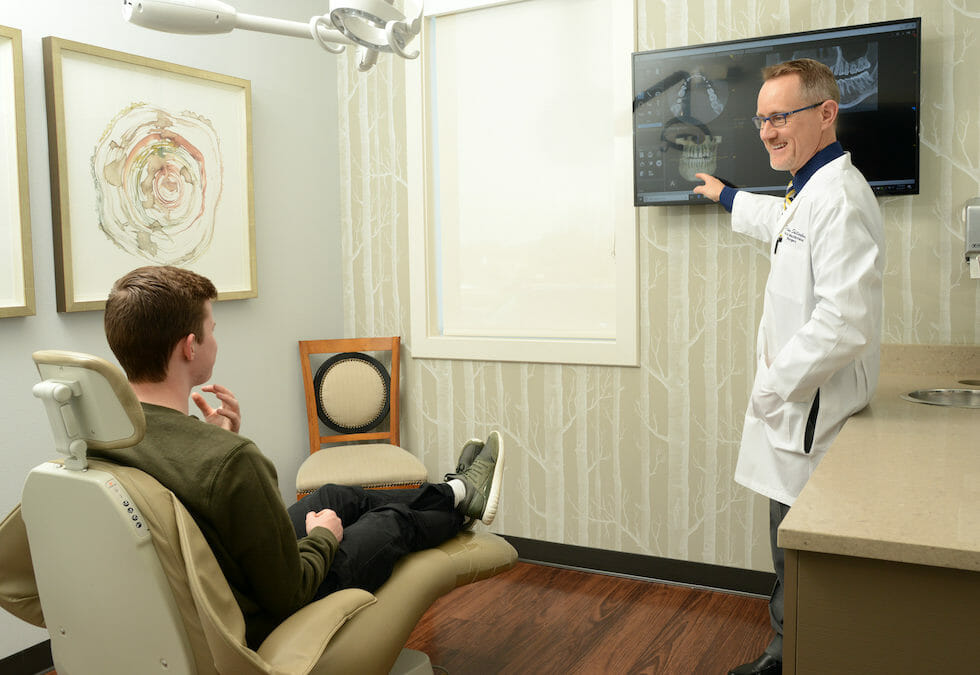When it comes to wisdom teeth, everyone is different. Some people have no problems at all when their wisdom teeth come in, and others may have to have one, two, or all four teeth extracted due to crowding or impaction. Whichever way it turns out for you, DFW Oral Surgeons are here to take care of you.
1. What are wisdom teeth?
Wisdom teeth are typically the last teeth to come into an adult mouth. They are called “wisdom teeth” because they usually begin to come in around the age of 17-25 years old when you are becoming “wiser.” They come in behind your last set of molars and for some, cause no problems at all. For others, wisdom teeth can grow in incorrectly and cause crowding, discomfort, and even infection.
2. How do I know if my wisdom teeth are coming in correctly?
When your wisdom teeth start to grow through your gums or “erupt,” you and your dentist will closely monitor their growth to determine whether or not they’re coming in correctly. Your dentist at DFW Oral Surgeons will use a regular exam and very often X-Rays to look for wisdom teeth that:
Aren’t in the right position under your gums
Have not come in properly
Have not come through all the way but have stopped growing
Do not have enough room in the mouth to come in properly
May be impacted, which means it failed to grow through the gums
These situations can lead to many dental problems, like food being trapped between teeth, difficulty flossing, crowding, or even infection. If your dentist sees any of these signs, they will probably recommend having your wisdom teeth extracted. If everything looks good, lucky you! You can keep your wisdom teeth.
3. Can I keep my wisdom teeth?
If you and your dentist or Oral Surgeon decide that it’s safe to keep your wisdom teeth, that’s great news! However, it is still essential that you see your dentist for regular checkups and cleaning to ensure that not only your teeth are clean and healthy but that there has been no change to your wisdom teeth beneath the gum line. The best way to determine whether or not you should keep your wisdom teeth is to visit a professional oral-maxillofacial surgeon. Their expertise will help you make the right decision about your oral health regarding wisdom teeth.
4. How do I know if my wisdom teeth are impacted?
Wisdom tooth impaction is not uncommon, but it can lead to many oral health issues. Impaction means that your tooth did not erupt from the gum line and is trapped under the tissue. There are four main types of impaction:
Mesial impaction – when a tooth is growing at an angle towards the front of your mouth
Distal impaction – when a tooth is growing towards the back of your mouth
Vertical impaction – when the tooth is pointing straight up but not erupting through the gums
Horizontal impaction – when the tooth is growing completely sideways
For many patients, any type of impaction can lead to uncomfortable symptoms, including:
Pain and tenderness in the back of your jaw
Impaction site swelling
A bad taste in your mouth or persistent bad breath
Red and/or bleeding gums
Difficulty opening and closing your mouth
Swollen glands and headaches
If you are experiencing any of these symptoms, DFW Oral Surgeons will do a thorough exam that includes X-rays. The best treatment for an infected wisdom tooth is usually extraction.
5. How are wisdom teeth removed?
At DFW Oral Surgeons, we recommend wisdom tooth extraction as early as possible so that the roots don’t have time to form completely. This proactive approach can prevent serious oral health issues in the future. If you do not remove an impacted wisdom tooth promptly, you could suffer from gum disease or even a cyst or tumor around your affected tooth.
At DFW Oral Surgeons, we extract wisdom teeth right in our office under anesthesia to make the procedure as comfortable as possible. During the procedure, your oral surgeon will make a small incision in the gum to expose the impacted tooth and the surrounding bone. Then, the bit of bone covering the tooth and the tooth itself are removed. The site is cleaned thoroughly, and in some cases, is stitched shut, although that is not always necessary. Lastly, a piece of gauze is placed over the extraction site to control bleeding.
6. How will I feel after I have my wisdom teeth removed?
You’ve probably seen videos on the internet of people feeling loopy, confused, or even emotional after their wisdom tooth extraction. Those symptoms are caused by the anesthesia and are short-lived and risk-free. You may experience some swelling in the cheeks and discomfort at the surgical site, but both can be easily treated with ice and an anti-inflammatory. If you experience extreme pain or swelling or feel like the area might be infected, reach out to your dentist right away.
If you want to schedule an appointment to talk to dentist at DFW Oral Surgeons about your wisdom teeth, contact us today.

